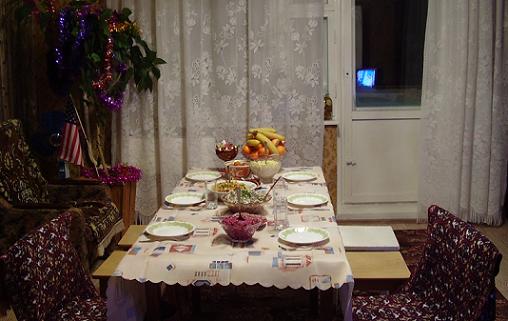С Наступившим! [Happy Not-so-New-Anymore Year!] Posted by josefina on Jan 2, 2009 in Culture, Soviet Union, Traditions
In Russia «Новый Год» [New Year] is the BIG holiday of the year, it is to one sixth of our planet Earth’s spacious land what Christmas is to most of the Western world. So if you’re in Russian between, let’s say when the first colorful lights start blinking, sparkling, glittering and the stores put up their first decoration… which is in October… yes, if you’re in Russia somewhere between October 1st and December 31st, you’d be expecting most Russians you meet to smile at you and say «С Новым Годом!» all the time. Or at least the week before New Year’s Eve. But they don’t. Not only are Russians tired of saying the whole sentence, starting with a little something like «Поздравляю тебя с…» [‘I congratulate you with…’], but they have actually tired of the whole ‘New Year’ thing, and so they only say «С Наступающим!». And that’s a very difficult thing to translate. That is what the masters of grammar like to call a present active participle. It is made from the verb «наступать» (which is the imperfect version, because the perfect version would be «наступить») which means 1. to step on; tread on, 2. to attack; go on the offensive; advance on or against, 3. to harass; press, 4. to come. Obviously, in this case I can read Russians’ minds, and know that they here are using the verb‘s fourth meaning. Thus what they’re really congratulating you and us as well as each other is ‘with the coming!’ or ‘with that which is coming!’ Either way interesting and weird fact of Russian tradition, right? And since today is already January 2nd, and what was coming is clearly already here, I played a small trick in this post’s title and changed the present active participle into a past active participle – «С Наступившим!» [‘with that which has come!’]. I bet you can all tell that continuing to learn Russian language in 2009 will be just as much fun as it was in 2008 or in 2007! Happy new learning everybody!
But now for something completely different – a couple of pictures from traditional Russian celebrations of «Новый Год»:
Like all the best holidays ever created by mankind, New Year in Russia is all about food. For six hours during New Year’s Eve you cut all kinds of grocery into tiny pieces, which you mix with large amounts of mayonnaise, thus making traditional Russian «салат» [salad]. The most popular kind is «Оливье» [commonly known in the rest of the world as ‘Russian salad’]. These salads (you should make no less than four) are all eaten up over the following couple of… weeks?
Sometimes when you don’t have a «ёлка» [spruce; New Year’s (or Christmas) Tree] you’ll have to make do with a plant and some glitter. And don’t let the American flag in the pot there fool you – this shot was made in Tobolsk when I celebrated New Year of 2007 with the sweetest Tartar family.
And what would Russian New Year be without all those sculptures made out of ice? If they say climbing them is only for kids, then they’re just making a ‘traditional’ Russian New Year pull of your leg… Or at least, that’s what I think.
And in Russia New Year’s Eve is just the beginning. Because after the 1st most people have 8 or even 10 days off, because Orthodox Christmas is on the 7th, and then «Старый Новый Год» [‘Old New Year’] comes on the 13th… and after that it’s high time to get ready for the 23rd of February [‘Man Day’], and after that there’s the 8th of March [International Women’s Day], so why do anything at all? Let’s all get ready for Victory Day straight away! Or at least for the 1st of May? It’s really just like in that old Soviet reversal – ‘In the US you can always find a party; in Russia the party finds you!’

Build vocabulary, practice pronunciation, and more with Transparent Language Online. Available anytime, anywhere, on any device.







Comments:
Lois Thorpe:
Are you truly perplexed by the expression? It’s been explained to me that С наступающим is used because of superstition. This makes a lot of sense – you don’t give presents before a birthday, rather on the date or afterwards, etc. Even on January 6, I wanted to say С Рождеством Христовим but I was told that technically I shouldn’t until after midnight. Anyhow, happy holidays… all the rest of winter and spring!